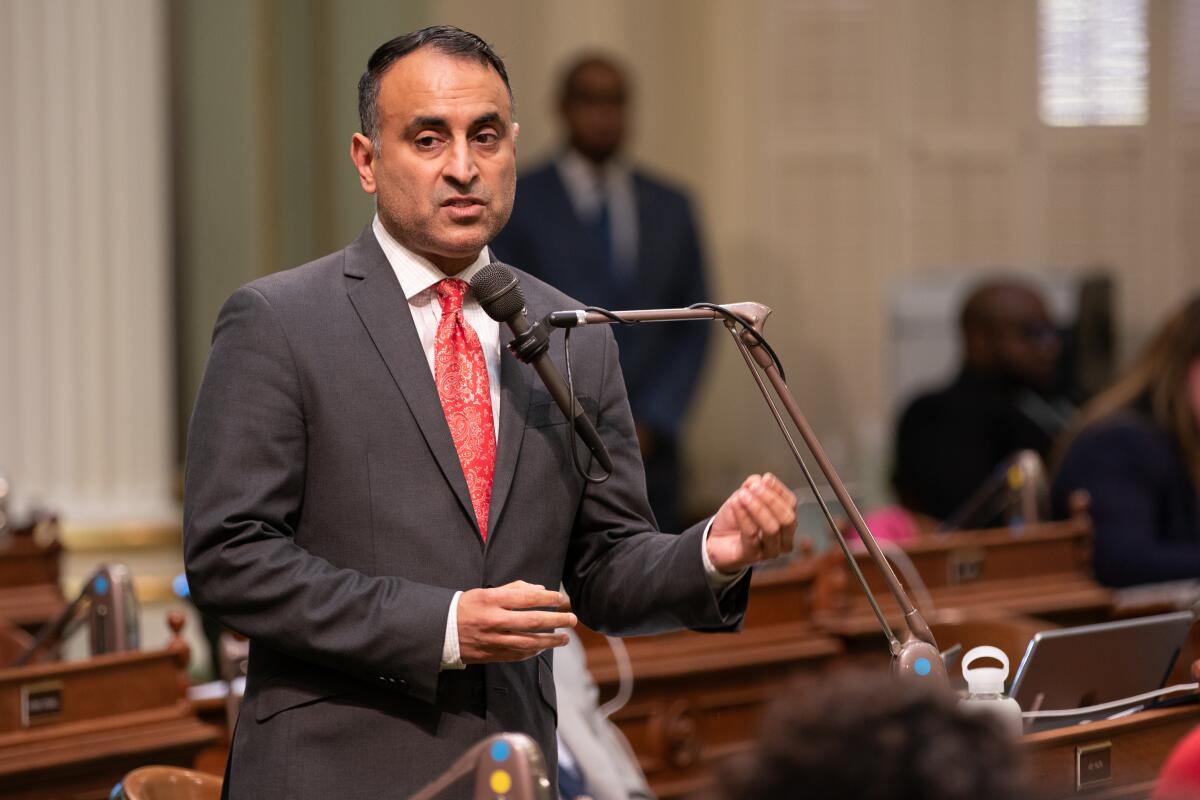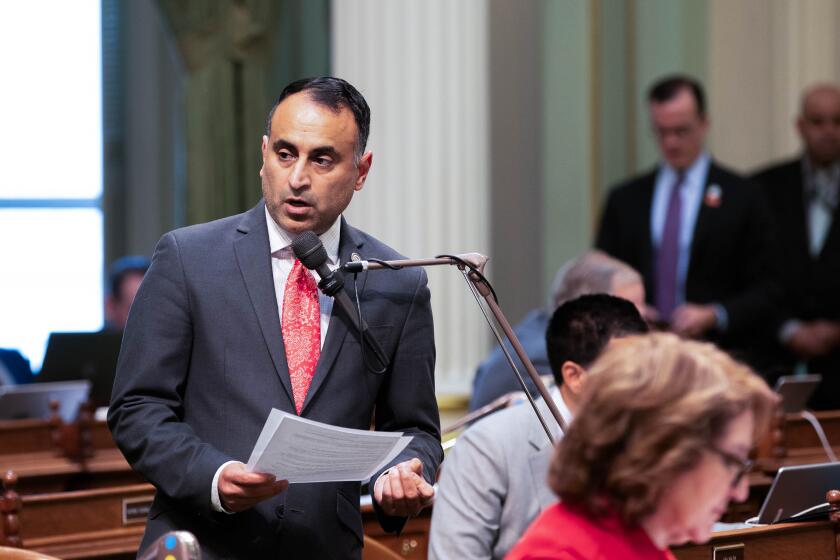California Democrats’ single-payer healthcare plan passes first hurdle

- Share via
SACRAMENTO — In any other year, Gov. Gavin Newsom’s proposal to add an estimated 700,000 immigrants without legal status to the state’s healthcare program for low-income residents would be a monumental lift. On Tuesday, it was painted as the “status quo” as legislators considered a separate proposal with a much broader reach.
A group of Democratic lawmakers are pushing a massive restructuring of the state’s healthcare system under legislation that would guarantee medical coverage for every resident in the state by enacting billions in new taxes to create a single-payer system. Assembly Bill 1400 passed its first hurdle during a contentious Assembly Health Committee hearing on Tuesday evening, moving forward legislation that has so far overshadowed Newsom’s proposal, but also faces significant bipartisan challenges moving forward.
The bill’s author, Assemblyman Ash Kalra (D-San Jose), said piecemeal reforms have only made it more clear that the state’s healthcare system needs to be upended. Kalra said Newsom’s effort is a positive step and shows the state’s compassion by ensuring no one is excluded from the healthcare system based on immigration status.
“However, do not mistake compassion for acceptance of a status quo that ultimately is fiscally unsustainable, unreasonably inefficient and morally indefensible,” Kalra said Tuesday.
The cost of the single-payer proposal remains a heavy obstacle for supporters — the $163 billion in proposed new taxes would not cover the price of implementing a healthcare system overhaul, according to a bill analysis. Exactly how much the proposal would cost if made law is still unknown, with the Assembly approving a Republican request on Tuesday for the nonpartisan Legislative Analyst’s Office to review the cost and effects of the legislation. The UC Labor Center estimates that creating a single-payer system could cost the state $222 billion a year, without additional cost savings from streamlined services.
Opponents say too many questions remain about how the single-payer plan, which would be known as CalCare, would work. The California Chamber of Commerce added the proposal to its annual “job killer” list that highlights laws corporate interests say will hurt employment and the economy, with a spokesman adding that Kalra’s legislation would “ruin quality healthcare delivery” and “create the largest tax increase in state history.”
A proposal to bring universal healthcare to California, laid out in multiple pieces of legislation, faces significant hurdles in the coming months.
“This would significantly underfund a single-payer system, which means all of us would actually pay more taxes than currently proposed,” said Preston Young of the California Chamber of Commerce.
Assemblyman Heath Flora (R-Ripon) said Kalra’s effort appeared to be nothing more than a ploy for attention.
“People have spent their entire lives paying into a system and then we are going to rip the carpet out from under them for a program that’s not even funded,” Flora said.
At Tuesday’s hearing, some who said they support a single-payer system or see a desperate need for overhauling healthcare also criticized Kalra, who they said failed to consider changes to his bill since it was first introduced last year.
“I passionately reject the argument that if one doesn’t believe this is the way to reform our broken health insurance and healthcare delivery systems that you support the status quo,” said Assemblywoman Cecilia Aguiar-Curry (D-Winters). “For those who make that intellectually lazy argument, you’re not helping those of us who are fighting to improve the system in our democracy.”
Kalra’s legislation and Newsom’s proposed healthcare expansion for those living in the country illegally have been competing for attention over the last two days, but the measures are largely supported by the same advocacy groups, raising questions about whether they would move forward in tandem or be pitted against each other.
“I don’t think these are mutually exclusive or competing conversations,” said Anthony Wright, executive director of the advocacy group Health Access. “These are all reinforcing and building on one another. I think it’s important to have the vision of getting to a truly universal and unified system, but I also think it’s important to take tangible steps, urgent steps, so that we can get people help now.”
Newsom’s plan, which was released as part of his budget proposal Monday, would allow those whose income falls below the federal poverty line to qualify for the state’s healthcare program for low-income people, regardless of immigration status. Extending coverage to people living in the country illegally has long been a priority for Democratic lawmakers in California, who first chipped away at eligibility hurdles in 2016 when the state offered Medi-Cal to children regardless of immigration status.
California Democrats are trying again for universal healthcare. It’s a debate well worth having
“We have the prospect to do something historic and meaningful and we hope to see this replicated across the country,” Newsom said Tuesday while visiting the Central Valley to highlight his proposal.
But the governor has faced questions about his commitment to a single-payer plan since Democrats said they would push the measure again this year. Newsom, who campaigned four years ago on implementing single-payer healthcare, said he remains committed to the goal and is awaiting a report by the state’s Healthy California for All Commission detailing different models the state could pursue.
“We want to do it in a practical way,” Newsom said. “We want to do it in a thoughtful way. ... Meanwhile we’re not waiting, we’re leaning in, providing more coverage.”
California already offers Medi-Cal to immigrants without legal status who are under 26 years old, and those who are 50 and older will qualify beginning in May.
Currently, immigrants without legal status who meet the income threshold — making less than $36,156 a year for a family of four — and are between 26 and 49 years old qualify for scaled-back Medi-Cal coverage, which covers only emergency room and pregnancy-related care. Under Newsom’s plan, the income eligibility threshold would instead qualify those insured for full-scope coverage, allowing for care that could prevent costly medical conditions that would have otherwise been treated in emergency rooms.
If approved by the Legislature and signed by Newsom in June, the budget proposal will cost $613.5 million in state funds during the current fiscal year and $2.2 billion each year after when fully implemented in 2024. The state’s overall Medi-Cal budget is $132.7 billion, with the program covering approximately 14 million Californians.
Financing for the single-payer proposal is far more uncertain, some lawmakers pointed out Tuesday. The funding plan for AB 1400 is contained in a separate measure, Assembly Constitutional Amendment 11. If passed by two-thirds of the Legislature, ACA 11 would then go to voters for approval. Kalra said the measures were separated so that the structure of the system could be finalized and the state could apply for the necessary federal waivers before a financing model is weighed by voters.
Critics argued that separating the legislation makes it difficult to assess the proposal holistically.
Under ACA 11, a new excise tax on businesses would be created equal to 2.3% of any annual gross receipts in excess of $2 million. A new payroll tax would be added for employers with 50 or more employees at a rate of 1.25% of total wages. An additional 1% payroll tax would be required for employers with workers earning more than $49,900 a year.
Personal income taxes would be raised for salaries above $149,509 a year beginning with an increase of 0.5% and increasing to 2.5% for salaries above $2.5 million. Personal income tax increases could rise with inflation in future years.
Kalra said the financing measure, if passed by the Legislature, is not likely to be put before voters until 2024. Supporters, including the California Nurses Assn., say the taxes would total less than what employers and Californians currently pay for private insurance.
“Study after study has shown that a single-payer system, like CalCare, is the only solution that would provide universal, comprehensive benefits to all while also reducing overall healthcare spending,” said Carmen Comsti of the California Nurses Assn., which sponsored the bill. “We would get more, cover everyone, and pay less.”
Many of the Democrats who voted in support of the bill said they have concerns that must be addressed to receive their future votes.
Kalra also acknowledged the challenges ahead, noting that previous efforts in California have “tried and failed many times before.”
“Why would I enter into such treacherous territory where failure is the most likely outcome?” Kalra said. “I entered into a life of public service for one reason above all else — to reduce suffering. And the reality is that in our state and our nation, we have a healthcare system that has far too much suffering embedded into it.”
More to Read
Sign up for Essential California
The most important California stories and recommendations in your inbox every morning.
You may occasionally receive promotional content from the Los Angeles Times.












